Primary navigation
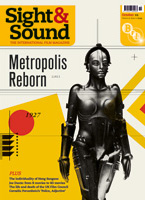
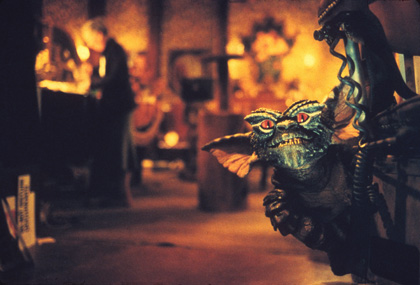
In a four-decade career, mainstream success never blunted Joe Dante’s anarchic streak. By Tom Charity
There’s a scene in Gremlins 2: The New Batch where a bespectacled and highly intellectual gremlin (credited as Brain Gremlin) is interviewed on cable TV. “Creature, what is it that you want?” asks the interviewer – who in true Joe Dante fashion happens to be a late-night movie host dressed as Count Dracula.
The gremlin gives his answer due weight. “Fred, what we want is, I think, what everyone wants, and what you and your viewers have: civilisation… The niceties, Fred. The fine points: diplomacy, compassion, standards, manners, tradition… That’s what we’re reaching toward.”
The Brain Gremlin goes on to name-check the Geneva Convention and Susan Sontag as Dante cuts away to show his fellow creatures carousing in bars, fighting and running amok. Then Brain Gremlin pulls out a pistol and blows away one of his less learned relatives. “Now was that civilised?” he muses. “Clearly not. Fun, but in so sense civilised.”
The scene is pure Dante, not least in the way the exchange is calibrated to appeal equally to eggheads and yahoos. It’s a reactionary gag, in as much as it implies civilisation is nothing more than a facade to camouflage baser instincts, but the joke itself has a sophistication that belies the anarchic punchline.
Nor is it any coincidence that this Brain is voiced by Tony Randall, a star whose career peaked early with Frank Tashlin’s consummate 1950s satire Will Success Spoil Rock Hunter?. An admirer of Tashlin, Dante is his natural successor, a cartoonist drawn to expose “the nonsense of what we call civilisation”.
From Tashlin, Chuck Jones and the other denizens of Termite Terrace, Dante takes a gleeful vulgarity, an oversaturated visual elan that’s as insistently in your face as Groucho Marx’s moustache. The fourth wall scarcely exists in a Dante movie – he wants us to be as aware of the fabrication as he is, to enter into the game of it. But it’s more than a game. Nabokov said a satirist cautions, a parodist plays. Dante’s detractors complain that his in-jokes are self-indulgent, but this is the director who turned down Airplane!. A dedicated cinephile, he interrogates and subverts convention even as he acknowledges tradition.
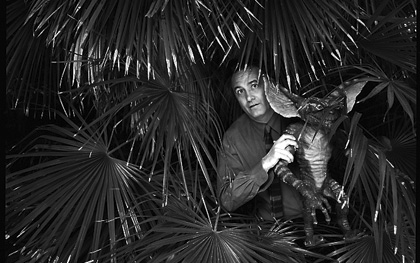
Joe Dante
His sensibility has been marked as strongly by the horror and science-fiction genres as by slapstick – there is a severity to his intelligence that won’t suffer the sentimental hypocrisies the mainstream offers. He has worked for Spielberg several times, but what is most interesting in Dante’s films is what separates them from Spielberg’s: a taste for hitting us with the unpalatable; an independent streak and anarchic energy that are often, in crass commercial terms, self-defeating.
Always a firm favourite with the alternative press, Dante has seen his critical stock rise in recent years, even as he’s been forced to the margins of the industry. Working for HBO and on Showtime’s Masters of Horror cable series, he has developed a more explicitly political critique of 21st-century Americanism. In The Second Civil War a governor closes his state’s borders to immigrants. In Homecoming dead soldiers rise from the graves to vote out a Republican president. It’s easy for liberal critics to applaud these allegories (Village Voice called the latter “easily one of the most important political films of the Bush II era”), but they are still recognisably of a piece with the more ambivalent and often more visceral earlier films.
The monsters in Dante’s creature features – and there have been a lot of them – may represent a scary Other, but invariably in his films we’re brought face to face with the equally scary Us.
An avid film collector even as a student, Dante and his friend Jon Davison collated this four/five/six/seven-hour movie marathon, a mash-up at least 30 years ahead of its time. It’s Dante’s Histoire(s) du cinéma, a camp collage of mid-20th-century American B movies, TV serials, commercials, informational documentaries and stag flicks (Dante estimates there are a thousand clip sources), all cut up in a clicker frenzy that anticipates the space transmissions picked up by the aliens in Explorers. Originally a subterranean item on the college circuit, The Movie Orgy has recently been revived at festivals and in one-off screenings in LA and London.
Dante and his co-director here, Allan Arkush, got their start cutting trailers for Roger Corman’s New World Pictures. Persuading Corman they could make the cheapest movie on his slate, they came up with a slap-happy satire of exploitation film-making, casting Paul Bartel as the resident genius at Miracle Pictures (“If it’s a good picture, it’s a Miracle”), and working in as many money shots from other New World flicks as they could.
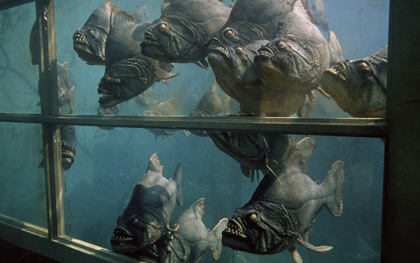
With a razor-sharp script by John Sayles, this Jaws rip-off works on its own terms as a monster movie limned with black comedy and satire – a recipe that would serve Dante well over the ensuing decade. Seventeen-year-old Rob Bottin wrangled the fish – a military experiment gone all too right – while the culty cast includes Kevin McCarthy, Barbara Steele and Dante’s most reliable fetish actor, Dick Miller.
Stepping up a notch or three in the production stakes, and again written by Sayles, Dante’s witty contemporary werewolf movie paved the way for the likes of Ginger Snaps, Dog Soldiers and, let’s face it, Twilight. Patrick Macnee’s Dr Phil-like pundit runs a country retreat where Dee Wallace’s traumatised TV reporter tries to pull herself together – unaware that her fellow patients are werewolves fighting a losing battle to repress their animal instincts.
A fan of Piranha who cast Dee Wallace in E.T. after seeing The Howling, Steven Spielberg invited Dante to Amblin to make Gremlins. While in pre-production on that feature, Dante turned in the most inventive of the Twilight Zone episodes, a creepy story about a spoiled kid who uses psychic powers to bend his family to his will – literally. This was the first time Dante revealed his love for the anarchic energy of Looney Tunes, not to mention his propensity for biting the hand that feeds him. Could too much TV turn you into a monster?
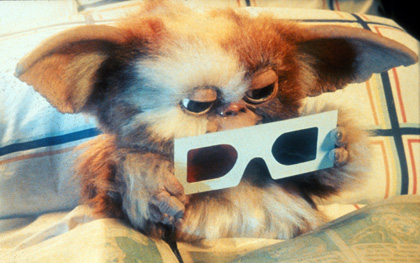
Dante’s only popular smash, this began life as a horror movie but mutated into a big-budget family entertainment – somehow retaining its genuinely vicious teeth. Dante fashioned it as an anti-Christmas film, inserting mischievous riffs on such seasonal classics as It’s a Wonderful Life, The Wizard of Oz and Phil Spector’s Christmas Album, trashing parochial small-town Americana, consumerism and greed, and – in a particularly transgressive conceit – holding up his rampaging signifiers as a mirror image to the ravenous, popcorn-belching movie hordes.
Dante’s warmest movie has three kids (including Ethan Hawke and River Phoenix) successfully building a spacecraft out of an old carnival ride. These are his kind of kids, dreamers and what a later generation would call geeks, anxious to meet head-on whatever mysteries the universe has to offer – and wretchedly disappointed when their extra-terrestrials turn out to be kids, just like them. Not surprisingly, it was shunned by an audience that expected nothing more than awe.
In which the very cocky Dennis Quaid takes a fantastic voyage into Martin Short’s neurotic backside. By Dante’s standards it seems a mainstream movie, but the outlandish premise is just a launching pad for this dizzying anything-goes comedy/sci-fi/ thriller, a manic travesty of male role-playing.
Though it’s presented as a broad Tom Hanks slapstick comedy, complete with dog-shit gags and Bruce Dern as a gung-ho army veteran, this is essentially a parody of Rear Window, with three overzealous neighbours taking it upon themselves to investigate the strange foreign family who have moved into the house across the street.
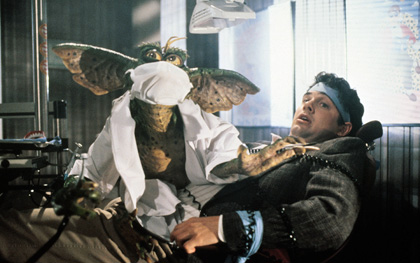
Warner Bros was so desperate for a sequel, Dante and screenwriter Charlie Haas were given carte blanche – just so long as they didn’t make fun of the merchandising. As if! They decided to let the Mogwai loose on the Clamp Center, a smart building and the cornerstone of the Daniel Clamp Empire. The Trump reference wasn’t subtle, but John Glover plays the movie’s billionaire developer as an engagingly enthusiastic naif. The movie begins with a Daffy Duck cameo created by Chuck Jones, setting the tone for the cartoonish mayhem to come – a gleefully scattershot satire of genetic engineering, corporate politics, New York manners and anything else that popped into the film-makers’ line of fire. It all culminates in a Busby Berkeley musical number.
John Goodman is Lawrence Woolsey, a small-time but larger-than-life film promoter touring Florida with his latest creature feature, Mant (half man, half ant). Again scripted by Charlie Haas, this affectionate tribute to schlock specialist William Castle draws out the darker undercurrents of 1950s and 60s sci-fi cinema by setting the comedy against the real terror of the Cuban Missile Crisis. Genuinely scary, even though the film within the film steals the show.
Made-for-cable remake of a 1956 exploitation movie.
TV pilot feature for an unproduced sci-fi series, written by Caleb Carr.
Prescient made-for-TV immigration satire with Beau Bridges and James Coburn.
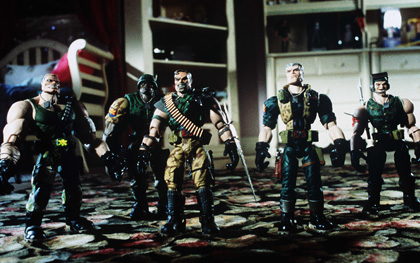
Back with producer Steven Spielberg to make a movie about toy soldiers who come to life (Gremlins 3, essentially), Dante came up with a miniature war film – the enemy is the military-industrial complex. At the time, comparisons with Toy Story seemed unavoidable, but watching Small Soldiers today it’s uncanny how it predicts Michael Bay’s rabidly reactionary boy-toy commercial, Transformers (also exec-produced by Spielberg). The violence was cut back by the nervous studio before release, though reviewers were still squeamish about what Jonathan Rosenbaum convincingly defended as a satire on how capitalism packages war for mass consumption.
Restoring Bugs Bunny and Daffy Duck to their insolent best was a perfect assignment, but Warner Bros and Dante didn’t exactly see eye to eye on the end result. The film does have passionate defenders, but save for a couple of inspired sequences, including the brilliant chase through the Louvre, much of the movie’s relentless madcap humour feels pretty thin. As Dante commented: “The movie that was released has a different beginning, a different middle and a different end than the movie I signed on to do.”
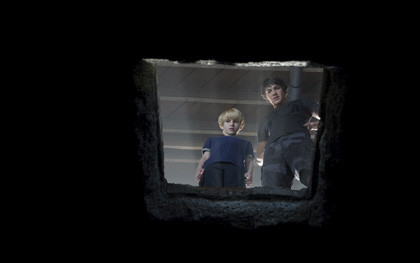
Independently financed horror, shot in 3D at Dante’s suggestion.
Netflix-Corman co-production starring Corey Feldman.
The Hole previewed at Movie-Con 2010 (online, August 2010)
Joe Dante on music in film (September 2004 Music in Film special issue)
Joe Dante’s top ten films (from our 2002 Greatest Films Ever poll)
Black Hawk Down reviewed by Philip Strick (February 2002)
The great leap forward: Tom Charity talk Joe Dante on the set of The Hole (magazine only, March 2009)